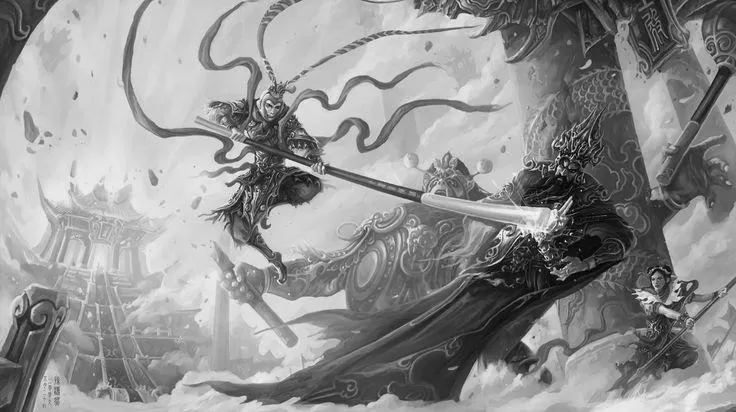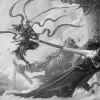If you are looking for information about the Nezha deity, you have come to the right place. Learn more about this heavenly king, who is a general purpose protector and an amazing martial artist. He is also the protector of his father, who sacrificed his life to save his son’s life.
Nezha is a heavenly king
Nezha was born during the Shang dynasty. He was the third son of the military commander Li Jing and Lady Yin. Lady Yin carried Nezha for three years before giving birth to him as a shapeless ball of flesh. Li Jing thought that the child was a demon. He decided to attack the baby and split it open, but Nezha was actually a young boy. He grew up to become a Pagoda-wielding Heavenly King and defended the people in need. He also had two older brothers named Lu and Shu.
In Chinese mythology, Nezha is also known as the Third Lotus Prince, and is the patron god of rebellious youth. His name originated from the Hindu god Nalakuvara, which was translated into Chinese as “Naluojiupoluo.” It was shortened to Nazha, and then romanized to “Nezha.” Nezha is depicted as a youthful man, often with a large spear and Wind Fire Wheels.
Nezha is also a famous character in Chinese mythology, and can be found in many classical novels and movies. His story begins 3,000-4,000 years ago, when Li Jing, a military commander during the Shang dynasty in northeastern China, became worried about his wife’s pregnancy. He sacrificed himself to save his parents, and his name was shortened to Nezha.
Nezha was born into a mortal family, but was raised by a Taoist immortal named Taiyi Zhenren. In a dream, Taiyi Zhenren appeared to Lady Li and told her about the mythological origin of her son. He also offered to take Nezha under his wing as a disciple. During this time, Nezha learned the ways of turning people into stone.
He is a general purpose protector
The Nezha deity is one of the most popular characters in Chinese mythology, and is also a popular subject for films and classical novels. The character’s origins are based on the Hindu god Krishna, who was brought into China as part of Buddhism. Krishna was said to have defeated a serpent in a similar way to the mythical Nezha. This story also mentions a nature spirit named Nalakubara, which was translated into Chinese as “Nazhajuwalo.” After translating the story, the name was changed to Nezha, which is the current name of the deity.
Ne Zha was born with two treasures. His two treasures are the Universe Ring, or Gan Kun Quan, and the Armillary Sash, or Hun Tian Ling. He also was given the ability to walk and talk. Then, he visited the Taoist immortal, Tai Yi Zhen Ren, who taught him the ways of Daoism. Tai Yi Zhen Ren hoped that Ne Zha would do great things, and he knew that Ne Zha would also do terrible things.
The Nezha deity is one of the most powerful gods in Chinese mythology. She has been worshipped for millennia. Meir Shahar’s illuminating account of Nezha reveals the hidden tensions in the Chinese family system. By applying the Freudian hypothesis to Chinese mythology, Meir Shahar reveals the many unrecognized tensions of the family system. While the Chinese legend is closely related to the Greek story, it is not identical to it. In fact, Nezha’s origins are quite different from the Greek counterpart.
He is a gifted martial artist
According to Chinese mythology, the gods sent Nezha to earth to be a teacher of martial arts. But Nezha soon fell into a world of trouble, battling with humans and dragons. When her father ordered her to flee for her life, she fought back and won the battle. The dragon king Ao Guang was angry and gathered other dragon kings to avenge his defeat. His son Li Jing was not happy, but Nezha stepped forward and fought back with a sword and a staff.
Despite her talent for combat, Nezha’s personality is not the most desirable. She has a tendency to get annoyed easily and pick fights whenever she can. She also does not share humanity’s value system. She believes that humanity is more of a hindrance than an asset.
Lady Yin became pregnant with Nezha for three years and six months. During that time, Nezha was a meaty ball of flesh. Her husband mistakenly believed it was a demon. Then, he hacked at the meaty ball and a fully grown boy appeared.
Nezha is the black sheep of the group. She is fiercely protective of her siblings, although she is slightly annoyed by the similarity of their faces. Her disobedience and ruthlessness toward Li Jing make her an unpopular martial artist. She also claims to hate children, and despite her ruthless attitude, she is constantly disturbed by Leizhenzi’s demands for attention.
He sacrificed himself to save his father
The story of Nezha deity who sacrificed himself to save his father has many facets. Ultimately, the story is meant to teach children the importance of filial piety. Children must respect their parents regardless of their own pride. This story teaches us that a parent must not only be respected, but also respected and obeyed.
In the original myth, Nezha was the youngest of three sons. Today, the character is often recast as the stereotypical ‘only child’ of modern China. He is a hero, one who fights injustice. For example, he turned off the water supply of the reservoir and redirected it to the poorer people of Donghai.
The story of Nezha’s sacrifice was a common theme in Chinese literature. The story is also found in classical 16th century Chinese novels, such as Journey to the West. In that book, the Jade Emperor summoned other deities, including Nezha. In one of these, Nezha befriended the Monkey King.
The legend of Nezha dates back to the ancient Chinese and Hindu cultures. He was introduced to China through Buddhist scriptures during the Tang Dynasty (618-907) and became a popular hero during the Yuan Dynasty (1279-1368). Throughout the centuries, he has been represented in popular folklore and the Buddhist and Daoist scriptures. In addition, he has had many versions and adaptations.
He is a Daoist immortal
The nezha deity is a Daofa, or Daoist, immortal from Chinese mythology. According to the story, the god Nezha was born of a mortal couple, who fought against the dragons in a battle. In the end, Nezha was killed by the dragons, but he was brought back to life by the Daoist immortal Taiyi Zhenren.
The legend says that Nezha was born during the Shang dynasty. His father was the military commander Li Jing, who later became known as the “Pagoda-wielding Heavenly King.” While the young Nezha was being born, he accidentally ended up inside the worm of Lady Li, the wife of the military commander Li Jing. Lady Li was pregnant for three years and six months and later conceived a son, who was named Nezha.
The legend of Nezha has numerous film adaptations, from the animated film Nezha Conquering the Dragon King to the 52-part animated series The Legend of Nezha. Nezha has also been featured in many video games, including Journey to the West.
According to Chinese mythology, Nezha had many powers and abilities. As a Daoist immortal, Nezha possesses several power-filled weapons. The Fire-tipped Spear of Nezha is one of her most powerful weapons. This weapon can burn a person in seconds. In addition to her power over fire, Nezha also possesses the Wind-Fire Wheels, a magical sword used to fly.
He is a pagoda-wielding heavenly king
The Nezha deity was born in the Shang dynasty. He was the son of a military commander named Li Jing. His mother, Lady Yin, gave birth to a ball of flesh, but Li Jing thought it was a demon. Instead, Nezha jumped out as a boy and was soon accepted by the immortal Taiyi Zhenren.
In Chinese mythology, the nezha deity is a paveda-wielding heavenly-king. It is believed that he has the power to capture evil spirits and protect people. He is often depicted with a young Vajra staff.
The nezha deity is a pagota-wielding heavenly lord who is the god of enlightened behavior and wisdom. The nezha deity was born during the Shang dynasty as a human, and was the student of Samantabhadra and Guanyin. He later married a woman and fathered a son.
Chinese mythology abounds with heavenly gods and goddesses. The Nezha deity is an important figure in Chinese culture. He is often depicted as a pagoda-wielded heavenly king and is celebrated in the Mid-Autumn Festival. Chinese people also place foods and mooncakes before the full moon to commemorate Hou Yi’s eternal love for his wife.







